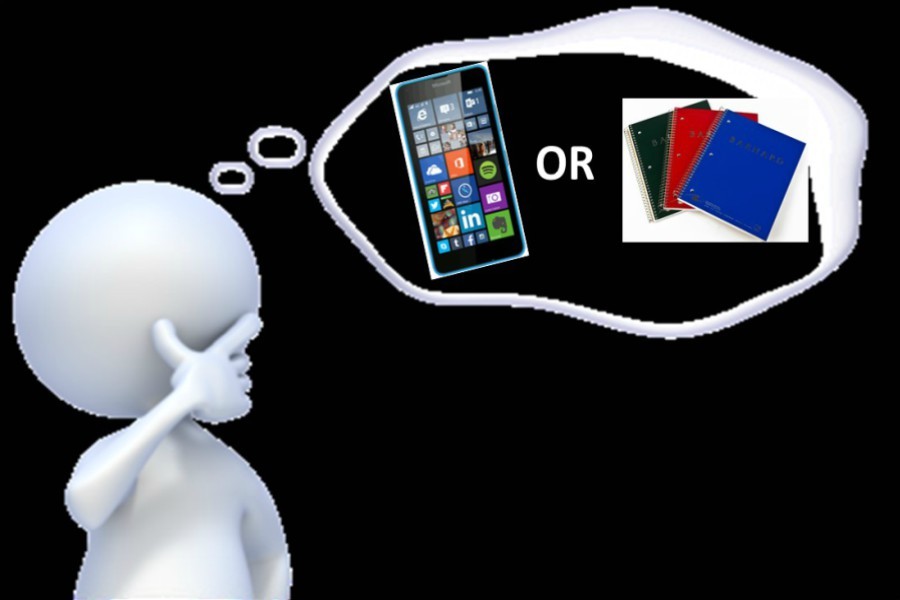Study shows cellphones hurt students’ grades
Cellphones in school have pros and cons
IMAGE / Kayla Smith
Phones can be distracting to students at school.
Students believe that using cellphones in class help them but they do not know that cellphones can actually take away from their education.
There are many advantages and disadvantages to being allowed to have a cellphone in school.
Students can have their phones on them and are allowed to use them during passing time and lunch.
Many teachers even allow phone use in class, as long as the students ask for permission, but other teachers are more strict and do not allow phones to be used at all.
Do they affect grades?
One study from the United Kingdom shows that cellphones do affect grades.
They can become a big problem while in the classroom, as well as at home.
When students do schoolwork at home, they easily get sidetracked by their phones.
For instance, a student could be using her calculator on her phone but have a notification pop up, causing her to look at Twitter or Instagram for the next 20 minutes.
Senior Colleen Desrochers agrees that her phone can distract her.
“It is easier to do my homework with my phone in the other room,” Desrochers said, “so when my phone gets a text or notification, I am not tempted to check it while completing my work.”
When students are distracted by their phones, they tend not to complete their work, causing their grades to fall.
Statistics show that students perform better when they are not distracted by cellphones.
One study from the London School of Economics, reported by CNN, shows that students’ test grades improved by 6.4 percent without their phones.
Underachieving students also revealed that not having their phones improved their grades. Their average test scores rose by 14 percent.
So next time students are curious of why their grades are slipping or why they are not learning anything, keep in mind that using cellphones can have an impact on grades.
So what exactly are the advantages and disadvantages?
Advantages
Students usually start their day with their phones, using them as alarms to wake up for school in the morning.
Students can listen to music during class, with their teacher’s permission, to focus on work instead of talking to other classmates and distracting other students.
Phones have access to the Internet, so students can access information they need to write a paper or to get examples to help with math problems.
Cellphones have apps that can help the student learn about different subjects.
If students miss a day, they can use their phones to take pictures of the assignments or notes they may have missed.
Students can sign up for text messages, called Remind 101, to get homework and quiz reminders from teachers.
Some teachers even have Twitter accounts that students can follow for cool tweets or updates about their class.
If students need to remind themselves that they need to bring something to class the next day, they can set an alarm to remind them.
In emergencies, such as shootings or fires, students are able to tell their family they are safe after the situation is controlled.
Or, if a parent suddenly cannot pick them up, the student can arrange for a ride home via text.
Disadvantages
For most students, using cellphones has become an addiction.
Students can easily hide their phones under books or behind people sitting in front of them and use them during class.
Students who compulsively use their phones during class often do not retain information taught in class lessons.
With phones, it has become easier to cheat than it would be without them.
During tests, students can easily pull up pictures of their notes or search for the answers they do not know. Some students will even skip school on a test day so their friends can sneakily take pictures of the test and answers to send to them.
Phones can also cause disruptions. When students have their phones out, they are more apt to look at them rather than listen to the teacher.
Theft is a problem, too, because phones have been stolen at school.
Phones can also be used as a tool for bullying. Students can take a video or a picture of their teachers or classmates that can be embarrassing and cruel.
In emergencies, it is nice for students to be able to contact their families, but it has caused parents to rush to the school and cause chaos during the emergency.
Finally, teachers often have to confiscate phones if the students do not put them away, causing the class to be disrupted.
Many students, including senior Kelsie Rose, believe students should use the privilege of phones wisely.
“If they are using their phones for research and help, it is fine,” Rose said. “But if they are abusing the privilege, it is not benefitting them or their grades.”

Class: Senior
Extracurricular Activities: DECA, Drama Club, works at Kmart
Sports: Tennis
Plans after high school: Attending Mott Community College,...

Class: Senior
Extracurricular Activities: National Honor Society, tutoring, cashier at Dairy Queen
Sports: Varsity tennis
Hobbies/Interests: Reading,...











Leah thomas • Dec 17, 2015 at 4:08 pm
Interesting this article comes from you Gracen! Kidding… Sort of. A well written thorough article though Gracen. Hope all kids at Kearsley read this. We teachers try to say this but teachers don’t know what’s best do we?!?! Ha
Jon Hansom • Mar 4, 2016 at 5:41 am
I teach secondary students (11yrs – 18yrs) in the UK.
In my experience the use of the cell(mobile) phone is detrimental when it comes to lesson time.
I spend a frightening amount of my class time controlling the usage of phones in class.
I would conservatively say around 10% of a 50 minute lesson.
This equates up to about 2 1/2 hours a week….10 hours a month….etc.
The disadvantages far out weigh the benefits for me. Do yourself a favour and leave yours at home.
Statistically it will give you an edge on your peer group!!!
As long as your teacher isn’t chasing others in your class about their cells(mobiles).